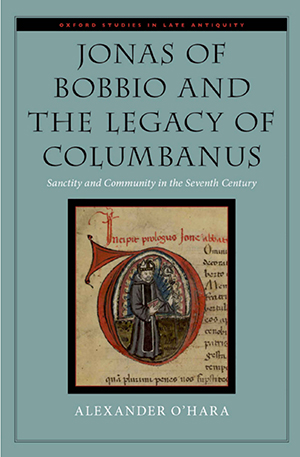JONAS OF BOBBIO AND THE LEGACY OF COLUMBANUS: Sanctity and Community in the Seventh Century
Published in Book Reviews, Book Reviews, Issue 1 (January/February 2021), Reviews, Volume 29 ALEXANDER O’HARA
Oxford University Press
€62.65
ISBN 9780190858001
Reviewed by Meredith Cutrer
Meredith Cutrer is a Ph.D student in University College Dublin’s School of History.
 Whether one loves him or hates him, few will disagree that the Irish monk Columbanus was remarkable. At once an unyielding ascetic, a provocative firebrand, an indefatigable monastic founder, an erudite author and a shrewd political operative, he evinced the confidence (or, less charitably, the audacity) to challenge bishops and monarchs alike. Renouncing Ireland around 590 to become an ascetic exile, Columbanus founded monasteries in Gaul before establishing his final community in Bobbio, Italy, around 613, two years before his death in 615.
Whether one loves him or hates him, few will disagree that the Irish monk Columbanus was remarkable. At once an unyielding ascetic, a provocative firebrand, an indefatigable monastic founder, an erudite author and a shrewd political operative, he evinced the confidence (or, less charitably, the audacity) to challenge bishops and monarchs alike. Renouncing Ireland around 590 to become an ascetic exile, Columbanus founded monasteries in Gaul before establishing his final community in Bobbio, Italy, around 613, two years before his death in 615.
As is customary with prominent medieval saints, Columbanus was the protagonist of a Life. The Life of Columbanus, written soon after his death, preserves his accomplishments and posthumous occurrences in his communities. More unusually for early Irish monastic founders, Columbanus himself left behind a diverse literary corpus. His controversial career and the quantity of sources by and about him have ensured his place as one of Ireland’s best-known saints.
Unsurprisingly, Columbanus’s fame has eclipsed that of his hagiographer, the Italian monk Jonas, a nearly contemporary but comparatively overlooked figure. Alexander O’Hara’s monograph shifts the focus onto Jonas, analysing him in his own right, thereby shedding new light on the motives of the clever agent so crucial in propagating Columbanus’s legacy.
The Life of Columbanus was written after a crisis that challenged Columbanus’s orthodoxy and monastic practices. Consequently, O’Hara argues, Columbanus’s standing needed restoration. O’Hara further demonstrates that Jonas’s concern extended beyond Columbanus as an individual to Columbanus’s communities: their reputation, their identity and their commitment to Columbanus’s teachings. O’Hara brilliantly incorporates the Life of Columbanus’s Book 2, detailing punishments suffered by rebellious members of Columbanus’s communities, to argue that Jonas was eager to highlight the dangers of departing from Columbanus’s vision. This analysis of Book 2, alongside an examination of the Life of John and the Life of Vedast, both also written by Jonas, underscores one of O’Hara’s primary contributions: his utilisation of often-neglected texts to offer fresh insights into Jonas’s motivations.
O’Hara’s study commences with an introduction surveying the scholarship relevant to his monograph before turning in Chapter 1 to detailing key aspects of Columbanus’s life, with an especially interesting consideration of Columbanus’s Irish upbringing. Chapter 2 examines Columbanus’s monastic rule and the tensions resulting from his onerous demands. One can understand a monk’s exasperation at receiving 50 lashes for neglecting to uncover his head upon entering the house, for instance.
Chapters 3 and 4 provide an engaging biographical sketch of Jonas and an analysis of his authorial style. O’Hara observes therein that the writings of both Columbanus and Jonas lack Augustinian influence. This is noteworthy. One of Augustine’s works that was available to Columbanus and Jonas, The City of God, offers the most fully developed treatment from Late Antiquity of the concept of the Christian life as an exile or pilgrimage (peregrinatio in Latin) and identifies Christians as exiles or pilgrims (peregrini). It is striking, therefore, that Augustine’s writings on peregrinatio do not seem to have influenced the theology of arguably the most important early Irish peregrinus or his hagiographer.
In this vein, Chapter 5 offers an exceptional examination of Jonas’s use of the Bible, including his approach to scriptural interpretation. After comparing exegetical features in Jonas’s works with early medieval Irish writings, O’Hara suggests that the absence in Jonas’s writings of the allegorical approach so prevalent in other Christian authors may derive from Irish influence during his monastic training in Bobbio. Here O’Hara adds to evidence pointing to distinctions in Irish exegesis associated with the Antiochene tradition, which preferred a literal scriptural interpretation instead of the allegorical one favoured in Alexandrian circles. O’Hara’s discussion then segues into Chapter 6, which offers a systematic analysis of Jonas’s utilisation of miracles, highlighting shifting notions of sanctity. Chapter 7 explores Jonas’s focus on the monastic community rather than strictly on Columbanus himself, and O’Hara concludes with an epilogue drawing his study together.
That this is an academic monograph should not put off a non-specialist. O’Hara has produced an outstanding, thoroughly readable work with wide appeal. As O’Hara’s study offers a close analysis of Jonas’s oeuvre, his monograph will be best enjoyed after reading his and Ian Wood’s superb translation of Jonas’s works, entitled Jonas of Bobbio: Life of Columbanus, Life of John of Réomé, and Life of Vedast.
Columbanus’s legacy has contemporary relevance. In a lecture initially delivered in 2018, O’Hara observed that Columbanus was the first recorded person to articulate the notion of Europe as a distinct community. Robert Schuman, a devout Catholic and one of the European Union’s foundational figures, drew inspiration from the Irishman, whom he credited as the ‘patron saint of all those who seek to construct a united Europe’. The enduring attraction of this extraordinary Irish saint is partly due to his accomplished hagiographer. O’Hara has provided a substantial contribution to an understanding of Columbanus and especially to an appreciation of Jonas’s methods and agenda. Jonas of Bobbio and the legacy of Columbanus is highly recommended for those with an interest in seventh-century Gaul and Ireland’s contribution to its development.
















